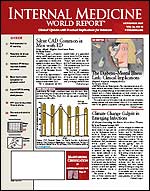Publication
Article
Continuous Drug Therapy Staves Off Colectomy in Ulcerative Colitis
Author(s):
By Daniel M. Keller, PhD
PHILADELPHIA—More than 33% of patients with ulcerative colitis (UC) who would otherwise need to undergo colectomy can avoid the surgery if treated with infliximab (Remicade). Reporting results of extension phases of the Active Ulcerative Colitis Trials (ACT) 1 and 2 at the American College of Gastroenterology meeting, Brian Feagan, MD, said that infliximab infusion every 8 weeks reduced the incidence of colectomy by 36% over 54 weeks of the study compared with placebo.
P
"The absolute risk reduction is 5.3%, and the value is .035," Dr Feagan continued, "and that translates into a number needed to treat of about 20." Infliximab also delayed the time to colectomy compared with placebo.
P
Infliximab therapy also showed benefits in terms of hospitalization rates compared with placebo ( = .003). "Hospitalization is the major cost driver for this disease," noted Dr Feagan, professor of medicine, epidemiology, and biostatistics at the University of Western Ontario, London, Canada.
Patients in ACT 1 and ACT 2 had baseline Mayo scores of 6 to 12 and were unresponsive to or intolerant of standard therapies, including corticosteroids, immunosuppressants, and 5-aminosalicylic acid (5-ASA).
In the 2 trials, 728 patients were randomized to receive infliximab, 5 or 10 mg/kg, or placebo at weeks 0, 2, and 6, and every 8 weeks thereafter through 22 weeks (ACT 2) or 46 weeks (ACT 1). Patients could continue taking corticosteroids and 5-ASA compounds during the trials. Final patient evaluations were conducted at week 30 (ACT 2) and at week 54 (ACT 1).
Complete data were available on 630 patients. At 54 weeks, 14.8% of the 244 patients receiving placebo had undergone colectomy compared with only 9.5% of the 484 patients receiving infliximab.
Patients were enrolled in the extension phases (n = 229) if the investigator thought they could benefit from continued infliximab treatment with the same drug regimen or placebo every 8 weeks.
Dr Feagan said that the original results reported in 2005 from ACT 1 and ACT 2 showed that about 66% of patients responded to infliximab (vs 37% with placebo), and about 33% went into remission, a significant difference compared with the placebo group.
Histoplasma capsulatum
In the long-term extension phases, fewer than 5% of patients discontinued therapy because of adverse events; there were a few cases of opportunistic infections. Serious side effects included prostate and breast cancer, pneumonia, sarcoidosis, abscess, and 1 death from histoplasmosis infection caused by .
Dr Feagan said that this study does not definitively settle the question about which is a better approach: monoclonal antibody therapy or colectomy. Colectomy does not cure the disease, and significant medical sequelae can occur.
However, in light of these findings, he said, primary care physicians may see more of their patients who have ulcerative colitis receiving infliximab injections. He suggests watching for potential side effects in these patients, including reactivation of tuberculosis, opportunistic infections, and serum sickness. "You shouldn't be giving live viral vaccines to these patients," Dr Feagan warned.






